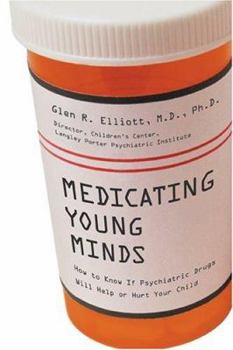Medicating Young Minds: How to Know If Psychiatric Drugs Will Help or Hurt Your Child
Treating a child with drugs before it's clear what is going on is worse than not treating a child at all. Let's face it: We are experimenting on these kids without tracking the results.-Glen Elliott, M.D., Ph.D. When you consider that 10 million children under the age of 18, including a growing number of preschoolers, are on anti-depressants and another 7 million are on stimulants for attention problems, it becomes obvious why Dr. Elliott has written this guide for parents who feel they have no choice. As the nation's leading expert on psychiatric disorders in children and the leading researcher on the effects of psychiatric drugs on kids, Dr. Elliott says that doctors and even teachers are too quick to recommend medicating young minds rather than taking the necessary steps to find out if drugs are even necessary.Medicating Young Minds tells parents what to expect, the questions to ask, the treatment they deserve from a concerned doctor, and even what tests to demand to make sure that drugs are the best recourse. Parents do have a choice, says Dr. Elliott, and this book empowers parents to make their own decisions. With detailed, step-by-step advice, he counsels parents on how to become active and informed participants in the diagnostic and treatment process. The long-term consequences of putting kids on psychiatric drugs are still unknown, and Medicating Young Minds will be of critical interest to all parents, teachers, and doctors concerned with the welfare of children.
Format:Hardcover
Language:English
ISBN:1584794895
ISBN13:9781584794899
Release Date:June 2006
Publisher:Harry N. Abrams
Length:272 Pages
Weight:1.23 lbs.
Dimensions:1.1" x 6.8" x 9.8"
Age Range:13 years and up
Grade Range:Grade 8 to Postsecondary
Customer Reviews
3 ratings
An Excellent Book, But Also Consider Natural Remedies
Published by Thriftbooks.com User , 18 years ago
The key to reading this book is to understand that the author is really trying to convey to you everything you need to know about making wiser decisions regarding possible medication for your troubled child. He is not interested in investigating natural remedies or in discussing in depth the environmental and societal dimensions of the problems these kids have--just in explaining the medications and other accepted therapeutic approaches. He and his co-writer do a fine job of spelling out in very clear prose, with helpful case studies, all the angles you need to consider. Dr. Elliott firmly believes in the value of administering drugs to many of these kids, but he is quick to note when it is inappropriate. Of course, the natural remedies are in fact important to examine. For instance, the newer clinical trial literature contains studies where certain herbal remedies perform as well as Ritalin and Prozac without the same level of side effects. And other natural remedies besides herbal ones deserve investigation. (My research suggests that correctly combining different types of natural remedies may well lead to outperforming Ritalin and Prozac.) Persuasive studies of environmental and societal influences causing or exacerbating these kids' syndromes also are worth reading. But that's all for another book. Dr. Elliott's does what it sets out to do very nicely.
Clear, Concise and Scary
Published by Thriftbooks.com User , 18 years ago
This is a very well organized and presented summary of current practice in child psychiatry, clearly written for the lay person. It gives guidelines for finding help for you and your child and a clear summary of the four major groups of behavioral and mood disorders. It also discusses the medications used to treat these various types of disorders as well as some alternative, non-drug therapies. I highly recommend this book to parents who are beginning to wonder if their child's problem behavior is more than just simple misbehavior. Having been on this road for 9 years now, I can see where our family was pushed in directions that were not the best for my child, and I plan to use the information in this book to get my son and his treatments re-assessed. Without a helpful book like this one we were subjected to some of the mistakenly but commonly practiced diagnostic methodology that may not have been the best choice for us. Unfortunately, this book also confirms what I have feared, that my worries over the future of my bipolar/ODD son are indeed justified and his life and mine will never be an easy one. One word of warning: this book may frighten you because it makes it clear how little we know about the causes of mood and behavioral disorders, as well as how little we know about how and why psychoactive medications do or do not work. Do not let that stop you from using medications if that seems to be the only way to relieve your child's mental and social pain. Huge progress has been made in psychiatry since the 1960's but an immense amount of work still needs to be done. Fortunately, this book clearly lays out what can be done at this time to help "problem" kids. On the other hand, unfortunately it also shows where research and knowledge are lacking. I highly recommend this book both for parents who are beginning to wonder if they might be bad parents because their child just can't behave, as well as for families already entangled in the mental health system.
Super Great Book
Published by Thriftbooks.com User , 18 years ago
Very well done and a must read for those in the field. Also a very good buy for the money spent. A +++++





